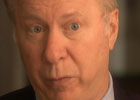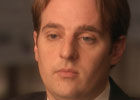Observations on the politics and the psychology that have shaped Dick Cheney's belief that America needs a powerful and virtually unfettered presidency.
- Barton Gellman
- David Gergen
- Evan Thomas
- Ron Suskind
- Charlie Savage
- Bruce Fein
- Related Links
- True Believers
What drives Bush and Cheney's views on executive power? - Presidential Power: The Bush Legacy
Assessments of whether the battles by the Bush White House to expand presidential power will have left the presidency more powerful than it was in 2000. - In His Own Words
Excerpts from Cheney's writings and statements over the years on executive power, published in FRONTLINE's 2006 report The Dark Side. Also, a 1996 interview with FRONTLINE for The Gulf War where Cheney explains why President George H.W. Bush could take military action against Iraq -- without seeking congressional approval -- after it invaded Kuwait. - The Cheney Factor
Reporter Kenneth T. Walsh lays out the upbringing, education and career moves that brought Cheney from Casper, Wyo. to Washington and helped forge his identity as the "intellectual godfather" of executive power in the Bush White House. (U.S. News & World Report Jan. 15, 2006) - Angler: The Cheney Vice Presidency
This June 2007 four-part Washington Post series -- drawn from over 200 interviews -- profiles Cheney and his impact on the executive branch. Part one explores Cheney's "different understanding with the president" about his role. Part two examines his sustained dedication to strengthening the president's power and how that philosophy shaped crucial decisions in the wake of 9/11. Parts three and four focus on Cheney's influence beyond the realm of national security, revealing how he has quietly become "the dominant voice on tax and spending policy" and used his vice presidential power to "undercut long-standing environmental regulations for the benefit of business."
Barton Gellman
The Washington Post
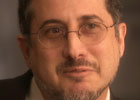
When Dick Cheney took the oath of office as vice president, we knew him to be about the most experienced hand in Washington, with the resume everyone knows. He was seen widely in public to be a conservative moderate, a very pragmatic guy, disciplined. He was not a guy to advertise his disagreements with the people he worked for. And the people he worked for were Republican moderates; you had Gerald Ford, you had George H.W. Bush. These were not radical conservatives, and he toed the line.
So when we look back at his backstory, what were the markers that we missed?
I'm not one to conclude that Dick Cheney has changed over the years -- the famous [former National Security Adviser Brent] Scowcroft [quote], "Dick Cheney I don't know anymore." I think Scowcroft is selectively remembering. On just about every debate on a hard question on national security inside the Bush I administration, Cheney was the outlier, and he usually lost because [former Secretary of State James] Baker and Scowcroft both had closer relationships with the president, and because the president himself was inclined to highly pragmatic positions. So when Dick Cheney wanted to sink some Iraqi tankers long before the U.N. authorized that, they said, "No, hang on a second. You're going to blow any chance of getting a resolution."
There were a lot of cases like that. Dick Cheney always advocated a very strong, edge-of-the-envelope view on executive power, and the previous presidents that he worked for didn't buy it. …
There's one other thing about Cheney: Cheney believes that he's a realist and that he is more realistic about the world than most of his adversaries and critics. He believes the world is an immensely dangerous place, that most people underestimate the risks to the security and well being of the United States, and that if you want to face those risks, there's no namby-pamby, legalistic, rule-bound approach that's going to work. If you want to fight the bad guys, you have to take the gloves off. So his views about what a president can do and what a president should do are very much in synch.
David Gergen
Adviser to Presidents Nixon, Ford, Reagan and Clinton
I went to work for President Ford, reporting to the president through Dick Cheney, his chief of staff. I was one in a group of about a half dozen of sort of Young Turks that Dick helped to assemble to bring order and vitality to the place. I must tell you that I, along with all of my colleagues, was enormously impressed by Dick Cheney at that time. He was a first-rate chief of staff; he was a man of great integrity. President Ford came to rely on him heavily during that time.
Dick Cheney was in his mid-30s then, just coming into his own as an adult and having a substantial amount of power and responsibility and exercising it as carefully as he could. He felt, as did all of us working then, that the presidency was too wrapped up in congressional regulation and laws that hamstrung the capacity of the president to carry out foreign policy. There had been such a reaction -- and it was natural -- to the scandal of Watergate that the Congress passed all sorts of laws to tie up the president, to make sure he couldn't break the bounds of the Constitution again.
But from the White House point of view, those laws -- you felt like you were Gulliver in Lilliput. You had all these strings that were tying you down, and you really couldn't act -- especially the War Powers Act, which really was a questionable assertion of congressional power.
So in effect we had moved from the imperial presidency of Richard Nixon very quickly into what many of us thought was an imperiled presidency under Gerald Ford. …
That was a pivotal moment in the education of Dick Cheney. Many of us felt strongly that the power of the presidency was threatened, that America could not lead in the world and couldn't get much done in Washington unless you had a more effective chief executive. Dick came out of that absolutely committed to the idea of restoring the powers of the presidency.
Now, after that happened, life moved on. … When Reagan came along, he, in the very natural order of things and without challenging constitutional boundaries, restored power; it began to flow back into the White House. …
So many of us felt that the powers of the presidency had been restored in the succeeding years after Ford and before Bush Jr. Dick Cheney does not believe that. He is among those who felt the president was still too hamstrung, and he came in bound and determined as vice president to change that. That was part of his personal mission.
Evan Thomas
Newsweek
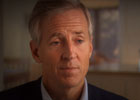
After 9/11, everybody was scared about another attack. But in the vice president's office there was a greater sense of urgency. They're seeing this intelligence every day, chatter, the president's daily briefing, which is full of this threat matrix and these threat assessments. And Cheney had an especially gloomy view of the world. He saw the world as full of threats more than most people. You could call it a kind of wise, prudential sense of caution.
But there is a dark side to Cheney, a melancholy, gloomy, foreboding sense -- he's almost Greek in a way -- of sensing the doom as inevitable, but you still have to do the best you can to fight it. He's right out of a Greek tragedy. And if you were surrounded by all this nasty intelligence forecasting a second strike, you can see why this side of Cheney would show itself. …
That's the dark side coming. That seems to be a natural step up from the use of power.
I think Cheney had the view about threats that the ancient Greeks had, which was that when the barbarians come, you have to be able to fight like a barbarian. The Greeks showed fair play and sportsmanship to other Greeks, but when they were fighting the barbarians it was anything goes. You have to fight dirty and fight tough because your civilization depends on it.
Ron Suskind
Author, The One Percent Doctrine
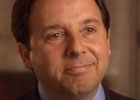
Cheney matches experience and capability and will in a way that is quite unique, certainly in terms of characters we've seen in the American stage for quite some time. What's interesting about Cheney is that he does what he does for what he will consider good enough reasons, good enough that intent flows to action.
When you get inside of his shoes and think about those reasons you understand that Dick Cheney is looking not to the next month or the next news cycle or the next election. Cheney truly believes he is in a conversation with history. And you can join that if you'd like or not, your choice. But that conversation will continue and Cheney will carry forward. That's Cheney's view of the world and where he fits in it. And if he's the last man having that conversation with history, so be it. As long as he has his hands on the levers, he is going to drive those levers and drive that boat at top speed.
Charlie Savage
Author, Takeover: The Return of the Imperial Presidency and the Subversion of American Democracy
What did Dick Cheney witness during Watergate and what do we know about his feelings at the time?
You cannot understand what has happened to executive power under the Bush-Cheney administration without understanding where Dick Cheney came from, what his formative experiences were. ... Watergate and the fallout from the end of the Vietnam War brought about a great crisis within the federal government. It awoke Congress from what had been a 25-year slumber about the power that was accreting in the executive branch and bleeding away from the other branches. Congress started to pass a series of new laws designed to reimpose checks and balances on the presidency, to re-establish some sense of constitutional equilibrium and to perform oversight investigations. ...
This is the moment in which the imperial presidency seems to fall. This is also the moment in which Dick Cheney has risen to the top of the executive branch and is getting his chance to help wield executive power from high in the presidential hierarchy. He is the chief of staff to Nixon's successor, Gerald Ford, and he's watching as the White House seems to be under siege, as its powers are being lassoed and tied back down to earth; as its ability to keep information secret is being undermined and national security information is flowing out the door and into the hands of Congress, and sometimes into the hands of the press through leaks. It's an outrage, from his perspective. He doesn't think that the Watergate scandal was an inevitable consequence of unfettered power. He sees it as just a policy dispute or maybe some personal failings on the part of Richard Nixon. ...
... When he ran for Congress, is it your sense that he's on fire about this, that this is a kind of life-defining ideology or political perspective? ... Or is it something else for him?
I think it's too strong to say that he ran for Congress with the specific intent of putting back the imperial presidency. I think he was just a guy who was interested in government and politics. ...
But it's once Reagan takes office and Cheney himself starts to rise within the ranks of the Republican hierarchy in the House that this pre-existing sense that developed during the Ford administration that presidential power had been damaged by the reforms imposed in the '70s starts to reassert itself. You see him defending the president's actions in sending troops to Lebanon and Grenada. You see him being one of the most outspoken defenders of the president's prerogative to handle foreign policy as he sees fit during the Iran-Contra scandal.
And there's other moments: In 1980, when Reagan was coming in, his first chief of staff, Jim Baker, had asked Cheney for advice about how to be a good chief of staff. ... Cheney met with Baker, and Baker took three pages of notes, which have since come out. Most of these notes are purely logistical -- how do you handle the president's calendar and so forth and so on.
There's one [piece of] policy advice on it, on the first page at the bottom. It's got lots of stars next to it and all kinds of underlining, and it says, "Increase the power of the presidency. Get rid of the War Powers Resolution," which made presidents have to start going to Congress again when they're going to dispatch troops into combat. "We've got to re-establish what we lost in the post-Watergate moment."
In the Iran-Contra scandal six years later or seven years later, Cheney was leading the dissidents within the House and the Senate who believed that the White House had all the power it needed to circumvent laws that said, "No assistance to the Contras in Nicaragua." Because the president is commander in chief, the president should have a totally unfettered hand when it comes to national security and foreign affairs, so Congress was wrong to pass that law in the first place.
That was a pretty wild idea at the time compared to [what] a lot of even Republicans felt.
That's right. The minority report that Cheney commissioned in the Iran-Contra scandal was viewed with derision by some of his fellow Republicans who joined the majority report, who said that Cheney and his faction had separated the wheat from the chaff and gone with the chaff. It was then dismissed when it was paid attention to at all. But of course flash forward 25 years, and Cheney is telling reporters, "Go back and read that report." ...
Bruce Fein
Associate deputy attorney general, 1981-'83
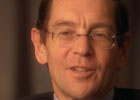
You knew him back when he was in Congress around the Iran-Contra time. … What did [he] believe?
With regard to Dick Cheney -- and he hired me to be a counsel on the Iran-Contra committee -- at that time he was unflappable, seemed very measured and restrained. Now, maybe it was because when you sit in the minority, you don't have a whole lot of authority. … But certainly with regard to his analysis and his lack of efforts to discredit the idea of separation of powers -- even though the Boland Amendment at that time, which was the big issue, curtailed the president's discretion in many respects in Nicaragua supporting the resistance there, he said you could criticize it as unwise, but it wasn't unconstitutional. It wasn't as though Dick Cheney said, "Well, Reagan should just ignore the law, pretend it isn't there," which is what President Bush does with regard to many of the limits on his authority.
So I did not have any sense at that time, '86, '87, that this was a member who was out to destroy and cripple the legislative branch and to have one-branch government. And I think that was the consensus of other people who knew him well at the time, including Brent Scowcroft, who was later national security adviser, who used even starker words that he doesn't recognize Dick Cheney today from when he knew him before.
What do you think happened?
I'm not a psychiatrist. I can make guesses and speculation, but that's really what it is. I think it's combination of, one, Lord Acton's "Absolute power corrupts absolutely." When you're in the minority, why scream and yell? You're going to get beaten over the head anyway.
And secondly, I think that the relations between the Republicans and the Democrats … caused him when he got to the White House, in the executive branch, and confronting Democrats in Congress [to think], "We can't trust these people." Even if the Republicans gained ascendancy for a period in the '90s, that wasn't going to be forever. I think he has a great disrespect for the legislative process and for members of Congress compared to what he thinks perhaps is superior thinking in the executive branch.
home . introduction . watch online . interviews . themes . join the discussion
producer's chat . readings & links . site map . dvd & transcript . press reaction
teacher's guide . credits . privacy policy . journalistic guidelines . FRONTLINE series home . wgbh . pbs
posted october 16, 2007
FRONTLINE is a registered trademark of wgbh educational foundation.
main photograph © corbis, all rights reserved
web site copyright WGBH educational foundation
